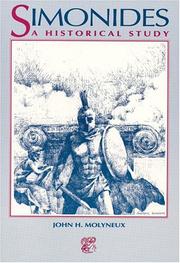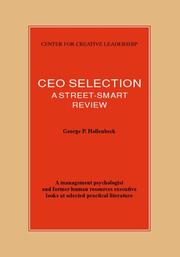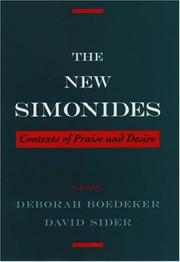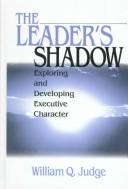Book
ISBN: 9780198850793 0198850794 Year: 2020 Publisher: Oxford Oxford University Press
Abstract | Keywords | Export | Availability | Bookmark
 Loading...
Loading...Choose an application
- Reference Manager
- EndNote
- RefWorks (Direct export to RefWorks)
Simonides of Ceos, one of the nine lyric poets enshrined in what is conventionally thought of as the Hellenistic Lyric Canon, is a relatively mysterious figure despite his renown in the classical world. Few historical and biographical facts about him have survived, and only fragments of his non-epigrammatic poetry.0This volume is intended to complement Orlando Poltera's full-scale text and commentary on Simonides' lyrics (Schwabe, 2008), offering an up-to-date edition and commentary covering, for the most part, those poems in elegiac distichs now called epigrams and elegies. In addition to these forms, Simonides wrote in a few other non-lyric metrical patterns involving dactyls and iambs: these are also included for the sake of completeness, since they are properly absent from Poltera's edition. 0As authenticity is in question for all but a very few of the epigrams ascribed to Simonides, the volume's scope extends to cover every poem ascribed to him in antiquity, including some poems that are surely not by him: these poems have never before been treated in such detail and the large body of scholarship generated by the corpus as a whole is taken into account here for the first time. Each poem and fragment is accompanied by a new English translation, where applicable, and detailed0exegetic line-by-line commentary; a comprehensive general Introduction sets Simonides and his works into their historical context and provides a thorough examination of the textual transmission of the elegies and epigrams.
Epigrams, Greek --- Elegiac poetry, Greek --- Greek elegiac poetry --- Greek poetry --- Simonides, --- Simonide, --- Simonides Ceus --- Simonides van Keos --- Simonides --- Simonides lyricus --- Simonide de Céos
Book
ISBN: 1613630891 1613630883 Year: 2018 Publisher: Philadelphia, PA : Wharton Digital Press,
Abstract | Keywords | Export | Availability | Bookmark
 Loading...
Loading...Choose an application
- Reference Manager
- EndNote
- RefWorks (Direct export to RefWorks)
800-CEO-READ BESTSELLERFeatured in Fortune, Harvard Business Review, and Entrepreneur, Go Long is "mandatory reading for the CEOs and boards of all public companies," according to David M. Rubenstein, co-founder and co-executive chairman of The Carlyle Group.The lifespans of companies are growing shorter each day. Why do some companies thrive and grow, while others fail?Inspired by the CEO Academy, the annual off-the-record gathering of chief executives organized by the authors, reveals how some of the world's most prominent business leaders resisted short-term pressures to successfully manage their organizations for the long term, and in turn, aim to create more jobs, more satisfied customers, and more shareholder wealth.In Go Long, authors Dennis Carey, Brian Dumaine, Michael Useem, and Rodney Zemmel take you behind the scenes to witness the business decisions that are enabling leading organizations to outsmart and outlast the competition.Why did CEO Larry Merlo allow CVS to take a $2 billion hit--on purpose? How did former CEO Alan Mulally maneuver Ford's $48 billion turnaround? How did director Maggie Wilderotter and her fellow board members engage top management to embark on an unusual exercise to help Hewlett Packard Enterprise build a long-term strategy? Why did former CEO Paul Polman turn back to Unilever's original mission of leading with a purpose to fuel profits? How did former Verizon CEO Ivan Seidenberg convince his investors and board to allow him to make a $150 billion bet? How did former CEO George Buckley find a way to address investor calls for 3M to spend less on research and development while still finding a way to innovate? These leaders argue that a short-term mindset might satisfy investors for this quarter or next, but there's a heavy price to be paid. Instead, they argue, long-term thinking is your best short-term strategy."Considering the enormous harm that short-term investing has done not only to companies, but to countries as well, this book should be required reading in boardrooms everywhere. A concise, powerful call for responsible, long-term business practices."--Kirkus Reviews"A must-read. If you're looking to build or lead a company that grows consistently not just from quarter to quarter, but year to year ... this book is for you."--Indra Nooyi, Board of Directors, Amazon; former Chairman and CEO, PepsiCo, Inc.
Strategic planning. --- CEOs. --- business development. --- business growth. --- business planning. --- decision making. --- leadership. --- long-term goals. --- long-term growth. --- long-term planning. --- long-term strategy. --- strategic planning.
Book
ISBN: 3835055046 3835006568 Year: 2007 Publisher: Wiesbaden : Deutscher Universitats-Verlag,
Abstract | Keywords | Export | Availability | Bookmark
 Loading...
Loading...Choose an application
- Reference Manager
- EndNote
- RefWorks (Direct export to RefWorks)
Organizations need to identify risks and chances of environmental changes in order to adapt to or possibly even to influence them. Early warning which comprises scanning and interpretation plays an important role in this process. Whereas the traditional contingency approach considers early warning as a part of the organizational structure, the extended contingency theory assumes the additional influence of an individual’s personality on early warning. Andreas Kirschkamp empirically analyses the early warning behavior of Chief Executive Officers in German medium-sized companies. First, he presents the design variables of early warning, then the influencing contingency variables. On the basis of the scholarly research on psychological and contingency theory, the author deduces hypotheses and tests them. The results show that early warning behavior is not only influenced by traditional contingency variables but also by personal attitudes. Therefore, the author proposes combining the extended contingency theory with the traditional contingency theory.
Chief executive officers --- Industrial management --- Small business --- Management. --- CEOs (Executives) --- Executive officers, Chief --- Business. --- Leadership. --- Business and Management. --- Business Strategy/Leadership. --- Executives --- Administration --- Industrial relations --- Organization --- Ability --- Command of troops --- Followership

ISBN: 0865162220 0865162239 Year: 1994 Publisher: Wauconda, IL : Bolchazy-Carducci,
Abstract | Keywords | Export | Availability | Bookmark
 Loading...
Loading...Choose an application
- Reference Manager
- EndNote
- RefWorks (Direct export to RefWorks)
Epigrams, Greek --- -Poets, Greek --- -Greek poets --- Greek epigrams --- History and criticism --- Biography --- Simonides Ceus. --- Simonides van Keos --- Simonides --- Simonides lyricus --- Simonide de Céos --- Poets, Greek --- History and criticism. --- Biography. --- Simonides, --- Simonide, --- Simonides Ceus

ISBN: 1281001341 9786611001346 1932973281 1882197046 Year: 1994 Publisher: Greensboro : Center for Creative Leadership,
Abstract | Keywords | Export | Availability | Bookmark
 Loading...
Loading...Choose an application
- Reference Manager
- EndNote
- RefWorks (Direct export to RefWorks)
Although CEO selection may be the most important decision an organization makes, there is little practical literature available on the subject. In this report, the author, a management psychologist and a former human resources executive, reviews selected books and articles on CEO selection and presents his personal views on the topic.
Chief executive officers -- Selection and appointment -- Book reviews. --- Chief executive officers -- Selection and appointment. --- Chief executive officers --- Commerce --- Business & Economics --- Marketing & Sales --- Selection and appointment --- Book reviews --- CEOs (Executives) --- Executive officers, Chief --- Executives --- Selection and appointment. --- Book reviews.
Book
ISBN: 9781316493816 9781107141704 9781316506653 1108651763 1316493814 1108699561 1107141702 9781108699563 9781108651769 1316506657 Year: 2018 Publisher: Cambridge, United Kingdom
Abstract | Keywords | Export | Availability | Bookmark
 Loading...
Loading...Choose an application
- Reference Manager
- EndNote
- RefWorks (Direct export to RefWorks)
Simonides is tantalising and enigmatic, known both from fragments and from an extensive tradition of anecdotes. This monograph, the first in English for a generation, employs a two-part diachronic approach: Richard Rawles first reads Simonidean fragments with attention to their intertextual relationship with earlier works and traditions, and then explores Simonides through his ancient reception. In the first part, interactions between Simonides' own poems and earlier traditions, both epic and lyric, are studied in his melic fragments and then in his elegies. The second part focuses on an important strand in Simonides' ancient reception, concerning his supposed meanness and interest in remuneration. This is examined in Pindar's Isthmian 2, and then in Simonides' reception up to the Hellenistic period. The book concludes with a full re-interpretation of Theocritus 16, a poem which engages both with Simonides' poems and with traditions about his life.
Simonides, --- Simonide, --- Criticism and interpretation. --- E-books --- Simonides Ceus --- Simonides van Keos --- Simonides --- Simonides lyricus --- Simonide de Céos --- Simonides, - approximately 556 B.C.-467 B.C. - Criticism and interpretation. --- Simonides, - approximately 556 B.C.-467 B.C.

ISBN: 1280473762 0195350227 1433700573 9780195350227 9780195137675 0195137671 9781433700576 142375753X 9781423757535 9781280473760 9786610473762 6610473765 Year: 2001 Publisher: Oxford New York Oxford University Press
Abstract | Keywords | Export | Availability | Bookmark
 Loading...
Loading...Choose an application
- Reference Manager
- EndNote
- RefWorks (Direct export to RefWorks)
Boedecker and Sider's edited volume gathers the best of the recent research on Simonides' newly expanded oeuvre into this collection ,which is a useful reference for scholars of Greek poetry.
Manuscripts, Greek (Papyri) --- Praise in literature. --- Desire in literature. --- Greek papyri --- Papyri, Greek --- Manuscripts, Classical (Papyri) --- Manuscripts (Papyri) --- Simonides, --- Simonide, --- Criticism and interpretation. --- Manuscripts. --- Simonides Ceus --- Simonides van Keos --- Simonides --- Simonides lyricus --- Simonide de Céos

ISBN: 0761915389 0761915397 1452231435 1322416389 1452264635 9781452264639 9781322416380 9781452231433 Year: 1999 Publisher: Thousand Oaks, Calif. : Sage Publications,
Abstract | Keywords | Export | Availability | Bookmark
 Loading...
Loading...Choose an application
- Reference Manager
- EndNote
- RefWorks (Direct export to RefWorks)
This empirical examination of the character of leaders covers areas such as personality, values and spirituality, and has been conducted through surveys and indepth interviews.
Chief executive officers. --- Executive ability. --- Leadership. --- Arbeids- en organisatiepsychologie --- management. --- CEOs (Executives) --- Executive officers, Chief --- Executives --- Administrative ability --- Executive skills --- Ability --- Command of troops --- Followership --- Leadership --- Executive ability --- Chief executive officers
Book
ISSN: 14217899 ISBN: 3906757323 9783906757322 Year: 1997 Volume: Bd. 1 Publisher: Bern: Lang,
Abstract | Keywords | Export | Availability | Bookmark
 Loading...
Loading...Choose an application
- Reference Manager
- EndNote
- RefWorks (Direct export to RefWorks)
Greek language --- Poetics. --- Grec (Langue) --- Poétique --- Word formation. --- Formation des mots --- Simonides, --- Language. --- Poetics --- History --- -Poetics --- -Poetry --- Classical languages --- Indo-European languages --- Classical philology --- Greek philology --- Word formation --- -Technique --- Simonides --- -Language --- -Word formation --- -Simonides --- -Simonides van Keos --- Simonides lyricus --- Simonide de Céos --- Language --- Poétique --- Simonide, --- Simonides Ceus --- Simonides van Keos --- Greek language - Word formation. --- Poetics - History - To 1500. --- Poesie lyrique grecque --- Simonide de ceos
Book
ISBN: 0520281012 0520958594 9780520958593 9780520281011 9780520281011 Year: 2014 Publisher: Berkeley University of California Press
Abstract | Keywords | Export | Availability | Bookmark
 Loading...
Loading...Choose an application
- Reference Manager
- EndNote
- RefWorks (Direct export to RefWorks)
Prodded by economists in the 1970's, corporate directors began adding stock options and bonuses to the already-generous salaries of CEO's with hopes of boosting their companies' fortunes. Guided by largely unproven assumptions, this trend continues today. So what are companies getting in return for all the extra money? Not much, according to the empirical data. In Indispensable and Other Myths: Why the CEO Pay Experiment Failed and How to Fix It, Michael Dorff explores the consequences of this development. He shows how performance pay has not demonstrably improved corporate performance and offers studies showing that performance pay cannot improve performance on the kind of tasks companies ask of their CEO's. Moreover, CEO's of large established companies do not typically have much impact on their companies' results. In this eye-opening exposé, Dorff argues that companies should give up on the decades-long experiment to mold compensation into a corporate governance tool and maps out a rationale for returning to the era of guaranteed salaries.
Chief executive officers -- Salaries, etc. --- Compensation management -- United States. --- Executives -- Salaries, etc. -- United States. --- Chief executive officers --- Executives --- Compensation management --- Business & Economics --- Labor & Workers' Economics --- Salaries, etc --- Salaries, etc. --- CEOs (Executives) --- Executive officers, Chief --- E-books --- american business. --- american economy. --- behavioral theory. --- big business. --- board members. --- bosses. --- business. --- capitalism. --- ceos. --- chief executive officer. --- compensation. --- corporate culture. --- corporate directors. --- corporate governance tools. --- corporate performance. --- corporations. --- economists. --- economy. --- era of guaranteed salaries. --- executive pay. --- human resource professionals. --- large salaries. --- leadership. --- motivation. --- performance pay. --- project management. --- stock options.

 Search
Search Feedback
Feedback About UniCat
About UniCat  Help
Help News
News